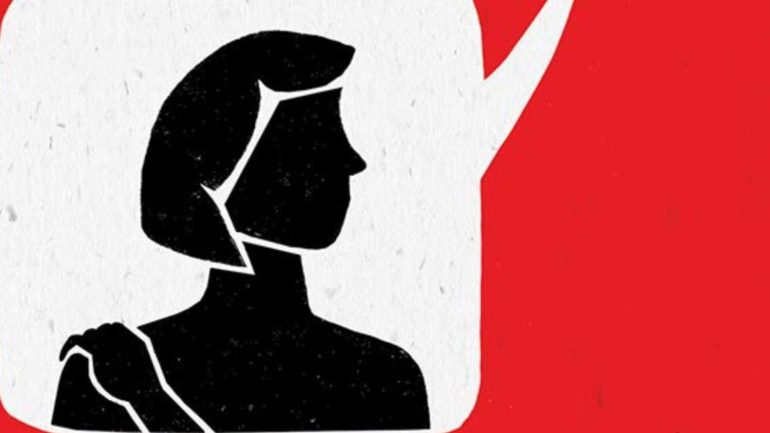By using the power of drawing, they [the artists] show us the condition of the lives they have lived, the condition of our culture, and the vital work we must do to render the need for an anthology like this obsolete.
These words end the powerful introduction to Drawing Power: Women’s Stories of Sexual Violence, Harassment, and Survival. Roxanne Gay provides the introduction for this collection of comics, and in it she also recounts her own story of survival. From that first page, if the title isn’t clear enough, we know this isn’t going to be an easy read.
Editor Diane Noomin, herself an accomplished comic artist, has put together a striking collection of work. The first cartoon, her own work, is visually arresting and contains an uncompromising list of just some of the famous men who have been outed by the Me Too movement. The message is clear – this book will be taking absolutely no prisoners.
The sixty or so comics included here are as varied as the artists themselves. Some are very simple, three panels, and some are pages and pages long, but all of them have an important truth to tell. The Verdict by Marian Henley shows a woman being crushed by the tanks of her attacker and then various members of the justice system, before she tells us that in the end, her attacker was let off but no one even bothered to tell her.
Rachel Ang’s Destroy Everything You Touch is a stunning pen and ink comic that explains Ang’s reluctance to relive her pain through Me Too, and how she deals with her abuser by quietly letting other women know what he is like before they start to work with him. And then, in a page that resonates rage and hurt. Ang admits that ‘At the right time, I will burn everything he loves. I will destroy him.’
It is truths like this, laid bare on the page, that makes Drawing Power such an arresting read. Some of the comics are so visceral and naked in their pain that they are hard to look at, but they deserve to be pored over and discussed. The bravery of any person who has come forwards to share their story – in the hope that, as Gay says, anthologies like this can be made obsolete – is a miraculous thing, when for so long many of them have suffered in silence.
The last comic, How Cartoons Became My Friends…Again, by Emil Ferris, ends the volume on a hopeful note. It is a comic about her abuse at the hands of a relative, but it is also a comic about recovery, and finding your way back to something that you love. It could be a glib note to end on, this hope that things will get better – especially when a lot of the other artists within are definitely still struggling – but it doesn’t feel like it. Indeed, it feels triumphant. The whole book feels like that, as women come together and share their stories and their pain, and the very act of sharing still feels like a victory, as people finally find a voice and, most importantly, an audience ready and willing to listen.
Review copy provided
Some of the coverage you find on Cultured Vultures contains affiliate links, which provide us with small commissions based on purchases made from visiting our site.


